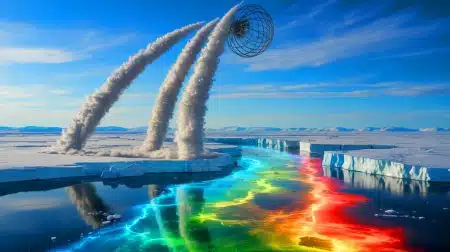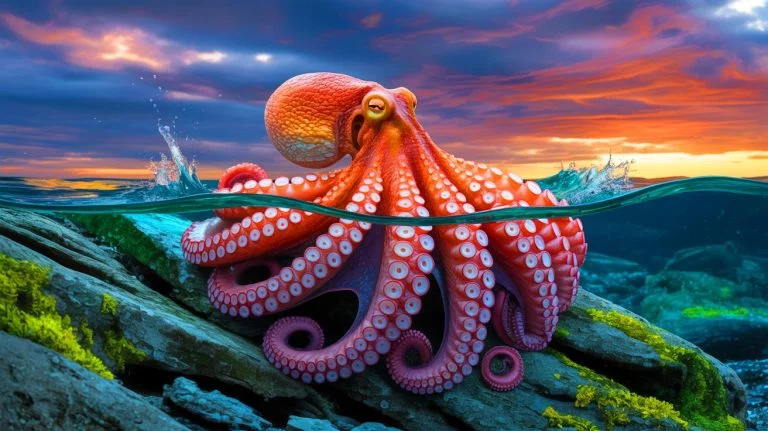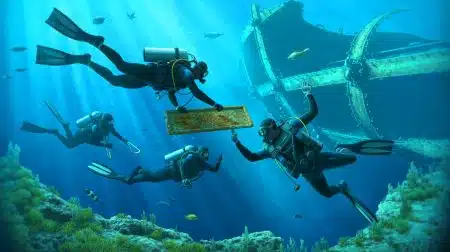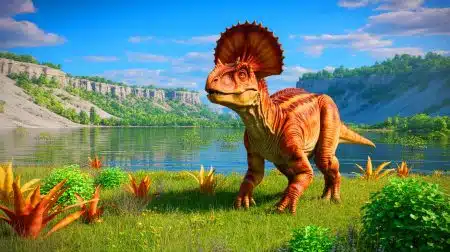| IN A NUTSHELL |
|
Amid growing concerns about the future of humanity, scientists are exploring scenarios in which other species might rise to prominence. Among these unexpected contenders is the octopus, a marine species whose intelligence and adaptability have captured the attention of researchers. With the potential for transitioning from water to land, octopuses present a fascinating case for evolutionary successors in a world without humans. This idea challenges traditional notions that focus primarily on mammals or primates as future rulers of Earth. What is it about octopuses that makes them such intriguing candidates for dominance in a post-human world?
Octopuses: A Marine Species Eyeing Land
The concept of humanity’s potential demise has been a topic of discussion among scientists studying collapsology. This field examines various scenarios that could lead to the downfall of human civilization, including environmental disasters, nuclear conflicts, or other catastrophic events. In such futures, octopuses might emerge as a dominant species. According to a 2024 article in the Oxford Mail, the intelligence of octopuses positions them as strong contenders for this role.
Timothy Coulson, a professor of zoology at the University of Oxford, theorizes that octopuses could evolve over time to become terrestrial creatures. These cephalopods already exhibit the ability to breathe outside of water for short durations, indicating a potential evolutionary path towards becoming land dwellers. Their cognitive abilities, evidenced by problem-solving skills and object manipulation, set them apart in the animal kingdom. In a world without humans, the octopus’s exceptional adaptability offers a distinct advantage over many other species.
A Future Civilization-Building Species?
Timothy Coulson suggests that the octopus’s ability to solve complex problems, manipulate objects, and camouflage with precision could enable them to develop into a civilization-building species. Their advanced neural structure and decentralized nervous system make them particularly suited for surviving in an unpredictable world. These traits could allow octopuses to exploit new ecological niches and adapt to a changing planet, especially in the absence of human influence.
Coulson posits that genetic mutations may occur as octopuses spend more time outside the water. Over millions of years, these changes could allow them to transition from marine to terrestrial environments permanently. This hypothesis challenges the common assumption that primates or large apes would naturally succeed humans as the dominant species. However, British researchers point out that these mammals, like humans, are highly vulnerable to certain phenomena, especially climate change. There is even a possibility that primates could vanish from Earth before humans.
Challenges and Implications for Evolutionary Successors
The idea that octopuses could become the next dominant species is both intriguing and contentious. It raises questions about the criteria used to determine a species’ potential for dominance. Traditionally, intellectual capacity and physical prowess have been key factors. However, the octopus’s decentralized nervous system and unique problem-solving capabilities suggest that adaptability and innovation might also play crucial roles.
As humans continue to impact the environment, the resilience and flexibility of a species become increasingly vital. Octopuses, with their ability to adapt to new challenges, exemplify these qualities. Their potential to transition from marine to terrestrial environments highlights the dynamic nature of evolution. This shift could redefine our understanding of intelligence and adaptability in the animal kingdom.
Reevaluating Humanity’s Role in the Ecosystem
The prospect of octopuses as future rulers of Earth invites reflection on humanity’s current role in the ecosystem. Our actions have far-reaching consequences, often disrupting natural habitats and threatening biodiversity. As the dominant species, humans have a responsibility to mitigate these impacts and consider the long-term viability of our planet.
This contemplation also underscores the importance of preserving the diversity of life on Earth. By fostering environments where various species can thrive, we contribute to a more balanced and resilient ecosystem. The potential rise of octopuses serves as a reminder of the interconnectedness of life and the unforeseen paths evolution may take in response to environmental pressures.
The idea of octopuses becoming the next dominant species challenges our understanding of evolution and dominance. It prompts us to consider what qualities truly define a species’ potential for success. As we ponder the future, one question remains: How can we, as stewards of the planet, ensure a sustainable and harmonious coexistence with other species in a rapidly changing world?
Did you like it? 4.5/5 (27)








Wow, never thought I’d see the day where octopuses are predicted to rule the Earth! 🐙
How long do scientists think it would take for octopuses to evolve into land creatures?
Octopuses as the next dominant species? Sounds like a sci-fi movie. 🎬
What about dolphins? Aren’t they super smart too?
Thanks for the article, but I’m skeptical. Octopuses ruling the Earth? Really?
Lol, I guess we’ll have to start building octopus-friendly infrastructure! 🤣
Could octopuses really breathe on land for long periods? That’s fascinating.
Why do scientists think mammals like primates won’t be the dominant species?
This article is interesting, but it feels a bit speculative to me.
If octopuses do evolve to live on land, what would they even eat?